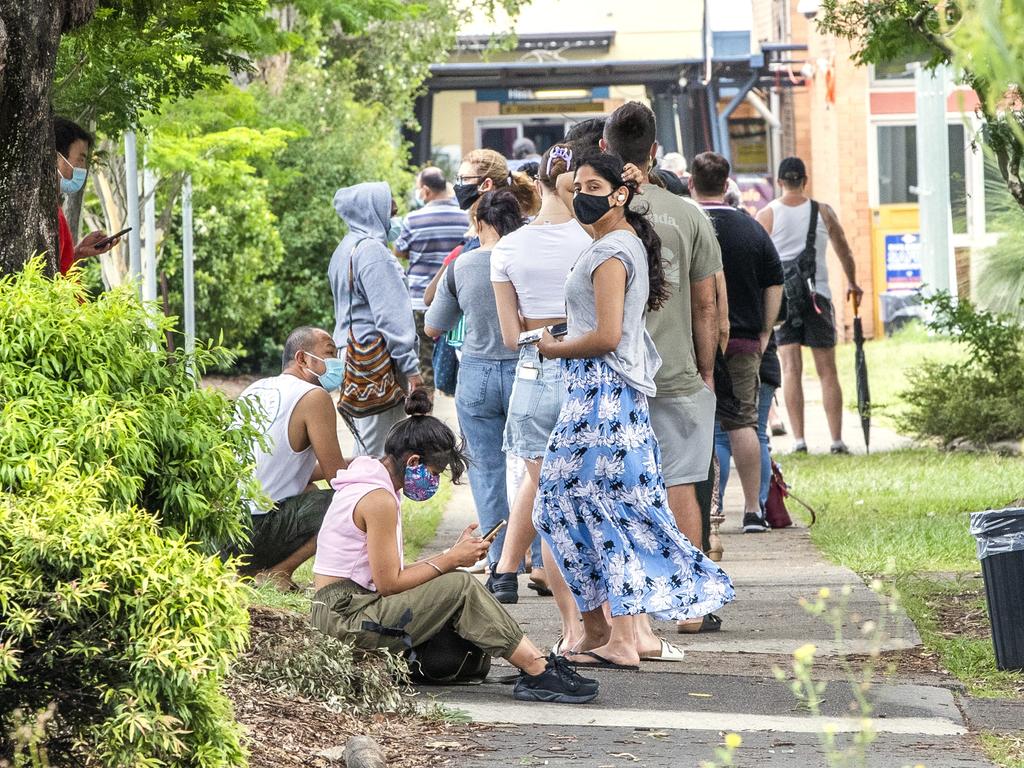How to manage Covid-19 symptoms at home
If you’re one of the thousands of Australians who have tested positive for Covid-19 and must isolate at home, here is what you should do next.
If you’re one of the thousands of Australians who have tested positive for Covid-19 and must isolate at home, health officials say there are simple steps to follow to manage your infection.
While people with chronic health conditions are at higher risk of hospitalisation, most people experience mild to moderate flu-like symptoms, many of which can be relieved by “simple remedies” such as bed rest, drinking water, throat lozenges, cough medicine and Panadol or Nurofen, according to NSW Health.
“Most people can manage Covid-19 at home, with some simple advice,” NSW Health says on its website.
“If you are under 65 years of age (previously under 50 years of age), have had two doses of Covid-19 vaccine, do not suffer from any chronic conditions and are not pregnant you can safely manage Covid-19 at home.”
People who may require further medical assistance managing the infection include the unvaccinated, immunocompromised, those with diabetes, obesity or severe mental illness, as well as other severe, chronic or complex medical conditions including cardiac, respiratory, renal or neurodevelopmental.

Here are the NSW Health guidelines.
How to manage Covid-19 at home
Each day, ask yourself:
• Can I get my own food?
• Can I drink water?
• Can I go to the toilet normally?
• Can I take my regular medication?
If the answer is “no”, or you feel dizzy or light-headed when standing up and walking around the room, call your GP or the NSW Health Covid-19 Care at Home Support Line on 1800 960 933 for assistance.
Cough
• Breathe in steam using a humidifier or vaporiser if you have one, or try a warm shower. This helps soothe a sore throat, open your airways and make it easier to breathe. Sip on fluids throughout the day.
• Avoid lying on your back. Lie on your side or sit upright instead. Raise your head when sleeping using extra pillows. This helps with breathing and clears any mucous from your chest.
• If you are coughing up mucous, it is important to continue to do this. It lowers the chance of chest infections and helps you breathe more easily.
Nausea, vomiting or diarrhoea
• Eat plain, low fibre foods that are not spicy. This includes white rice, pasta and white bread.
• Have small meals often. Have six smaller meals in the day instead of three big meals.
• Do not drink alcohol or drinks with caffeine such as tea, coffee and colas.
• Sip on clear fluids such as water during the day. This will help you to stay hydrated. Drink enough fluids so that your urine is light yellow in colour and clear.
Fever
• Take paracetamol (e.g. Panadol) as directed.
• Put a cool, damp washcloth on your forehead.
• Wipe your arms and body with a cool cloth.

‘People are able to self-manage’
NSW recorded 38,625 new cases on Friday, with Premier Dominic Perrottet slapping the state with new restrictions to combat the skyrocketing numbers.
Speaking to reporters, chief health officer Kerry Chant said many people would seen their friends and colleagues “experiencing a mild illness”.
“But we do know that there’s some groups, particularly those with underlying chronic health conditions … that they may have a high risk of hospitalisation and admission to ICU,” she said.
“It’s important that those individuals are linked to care and in those circumstances, we will be reaching out to those individuals.”
Dr Chant stressed that “many people are able to self-manage” if they test positive on a rapid antigen test.
“Treat yourself as if you’ve got a case (of the virus), isolate, get your household to isolate, get them all to do RAT tests,” she said.
“The key issue is you can self-manage, but if you’ve got any of those chronic health conditions or those risk categories, we do want to link you to care because there may be some therapies that we can administer that will reduce your risk of going into hospital or requiring ICU.”
Dr Chant urged people to please “not go out and about” if they have symptoms.
“There are some fact sheets on our website and we’ll provide some links to them which also tell people about practical steps to prevent them going to things like maintaining hydration, making sure you’re keeping your fluids up, so it’s practical things you can do to manage at home,” she said.
Australia has no officially approved early at-home treatment for Covid-19.
The Therapeutic Goods Administration has warned against off-label use of common existing medications such as ivermectin and hydroxychloroquine, which have been held up by some doctors overseas and popularised by podcast host Joe Rogan.
“TGA approval for a medicine to treat one condition, does not mean that it is safe to treat another condition,” the Health Department says.
“Doctors who prescribe medicines ‘off-label’ must consider the risks for the patient.”
The TGA is currently evaluating a number of Covid-19 treatments including Merck’s antiviral pill molnupiravir, which has raised safety concerns for pregnant women over potential birth defects.
Australia has already ordered supplies of molnupiravir for use if the TGA grants approval.






